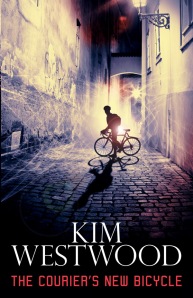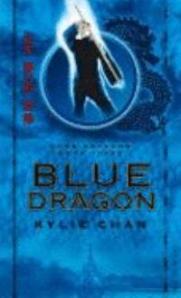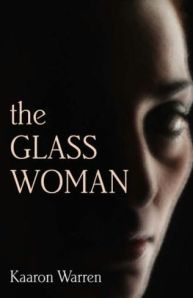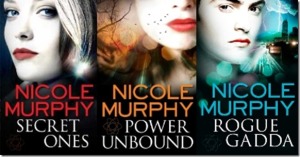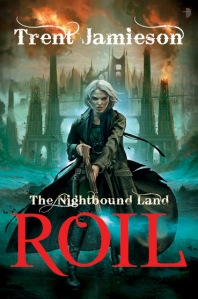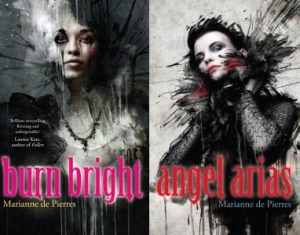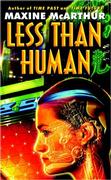As the next of my series featuring fantastic female fantasy authors (see disclaimer) I’ve invited the talented Nicole Murphy to drop by.
Watch out for the give-away question at the end of the interview.

Q: With your Asarlai trilogy there is a strong love story running through each of your books. Is this because you are a romantic at heart?
 Oh, absolutely. Big, soppy, kissy-kissy romantic. I’ll cry at romantic movies. I’ll sigh when the big proclamation of love scene comes. I think about Chandler proposing to Monica, or Lizzie finally accepting Darcy, and I just swoon.
Oh, absolutely. Big, soppy, kissy-kissy romantic. I’ll cry at romantic movies. I’ll sigh when the big proclamation of love scene comes. I think about Chandler proposing to Monica, or Lizzie finally accepting Darcy, and I just swoon.
When I started writing, I was trying my hand at epic fantasy and space opera. Then I realised that no matter what I attacked, it came with a strong romance subplot. So I decided to drop the rest of it and have a go at writing a fantasy romance. That was the original draft of Secret Ones.
Q: This trilogy strikes me as a modern take on Irish mythology. What attracted you to use this as a background for your world building.
Ireland came about because I couldn’t figure out how to use Australia. I’d decided the gadda were going to be a race that developed alongside humans but from different ancestors. I tried to make that ancestry Australian, but I couldn’t get my head around how to do that and not do something wrong to Indigenous mythology. So I tried another direction – humans originated in Africa. What’s the opposite of Africa? Answer – Ireland.
The great thing about this is because I’m not dealing with humans, I don’t necessarily have to be true to Irish mythology. The way I see it, the gadda are on the other side of the stories. They’d agree with some of the elements, but others from their point of view would be just plain wrong. So I’ve got the freedom to play within the mythology without having to be accurate.
Q: I hear you’ve put a proposal to your publisher for a new trilogy. Is it in the same world as the Gadda? Tell us a little about it.
It is in the same world as the Gadda. In fact, it’s the sequel to Dream of Asarlai. The new trilogy is called People of the Star and is set two years after Rogue Gadda. I’m taking the new world that’s resulted from the events of Rogue Gadda and really putting the guardians, their friends and family through the wringer.
It’s got the same structure as Dream of Asarlai, so there’s an overarching storyline but each book is a stand-along romance. You’ll be able to read People of the Star without having read Dream of Asarlai, although of course I’d prefer you to do both J
Cross fingers and toes for me that the publisher loves it and wants it too.
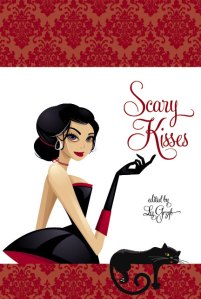 Q: I see you also have a story in Scary Kisses and More Scary Kisses. Did you start out writing short stories?
Q: I see you also have a story in Scary Kisses and More Scary Kisses. Did you start out writing short stories?
I was writing short stories and novels at the same time. I had more instant success with short stories – the first half a dozen stories I wrote I sold. This however twisted me a bit and while I recognised what I needed to learn with novels and worked hard on it, I kinda coasted with the shorts but as I aimed for better publications, the sales dried up.
Over the past twelve months, I’ve changed things around and started to work as hard on my short stories as I have on the novels and it’s starting to work. Apart from the two you mentioned, I’ve got a story in Issue 50 of Andromeda Spaceways, a flash piece in the upcoming Conflux Cookbook and hopefully there will be more sales this year.
I see shorts as a great way to challenge myself and experiment without having to sacrifice weeks or months to it. Learn in the shorts, apply to the novels .
 Q: You went to the Romantic Times Convention in Los Angeles. What was it like? If someone was going to go, what advice would you give?
Q: You went to the Romantic Times Convention in Los Angeles. What was it like? If someone was going to go, what advice would you give?
RT was fantastic! I had such a blast, I’m going to try to go again next year. RT is a convention much like our science fiction ones – panels during the day, social events at night. Except the romance community does things with a flair and bravado that would make a lot of SF people blush – and that’s not just the erotica writers J As RT isn’t just about romance nowadays but also covers fantasy, science fiction and mystery, it’s a great place to go to network with a large number of publishers, agents, writers and most importantly readers! And perhaps best of all – man will you score free books. I came home with twenty, and I stopped grabbing books cause I was worried about weight!
Q: It says in your bio that you were a teacher. Which subjects/ages did you teach and what are your best memories about being a teacher?
I taught primary school and over the nine years managed to cover everything from Kindergarten to Year Six. My favourite time was the three years I spent in Djarindjin/Lombadina, an Aboriginal community on the Dampier Peninsula in WA (north of Broome). It was fun, inspiring, awesome and a time I will never forget.
Q: You won an award for your series of article on mental illness. What prompted you to investigate this subject and what did you as a person take away from writing these articles?
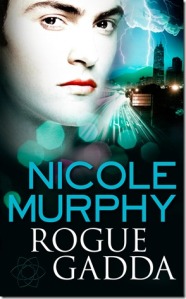 I started to work on it because mental illness is something that’s always interested me. A number of members of my family have had difficulties with their mental health and in fact, I’m currently dealing with depression myself.
I started to work on it because mental illness is something that’s always interested me. A number of members of my family have had difficulties with their mental health and in fact, I’m currently dealing with depression myself.
The thing I took away is that these are just people. It can be easy to be scared, particularly of some of the more severe conditions like bipolar or schizophrenia because some of the behaviour can be disturbing. But at the end of the day, they’re folks like you and me. They laugh. They cry. They struggle every single day with the impact of their illness and the smallest thing – a smile, a g’day, a nod – can make the world of difference.
Q: I was prompted to start this series of interviews because there seems to be a perception in the US and the UK that fantasy is a bit of a boy’s club. Do you think there’s a difference in the way males and females write fantasy?
I do. Not that I think that one is better than the other and of course there are exceptions, but my experience is that women’s books are different to men’s. I think we’re still in an age where socialisation does impact on the life experiences of men versus women, and that inevitably has an impact on the writing. Maybe not necessarily on the content, but on the tone and the understanding of societal privilege and what perspectives of the content are shown.
I’d love to see an experiment where a range of men and women were told to write the same scene, with the same character outlines and restrictions, and see what happens. Each one would be different, because people are different, but I think you’d find that the women’s writing would reflect a group opinion different to that of the men.
Q: Following on from that, does the gender of the writer change your expectations when you pick up their book?
Absolutely. Does that mean I read one more than the other? Well, at the moment I’m tending to read most within the genre of romance, and particularly paranormals. So I am reading more women than men, because more women write in that genre. Does that mean men can’t? Of course not – Trent Jamieson is writing a fabulous urban fantasy series at the moment.
 Q: And here’s the fun question. If you could book a trip on a time machine, where and when would you go, and why?
Q: And here’s the fun question. If you could book a trip on a time machine, where and when would you go, and why?
That’s such a hard question. There’s so many time periods that I love. But I’ve decided on a really personal one – I’d go back to after Worldcon last year and make some changes to my life that I’m sure would ward off the depression.
Nicole has kindly offered a copy of one of her books (you decide). Give-away Question:
Would you want to have magical powers? What would you do with them.
Follow Nicole on Twitter: @nicole_r_murphy
See Nicole’s Blog.
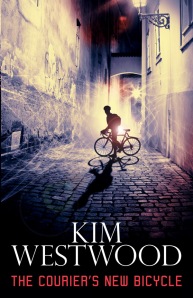 Thanks to all for the interesting choices. I like Richard’s message in reverse, and Cecelia’s right about the little everyday things getting lost to time. The big mac…let me think…eeeeew, Belinda, eeeeew! Why not write a very long note to self, Sean, and in ten years time publish it as a book? But it’s Bren’s choices that win for me: anti-pitfall warnings followed by HP1-7 and a typewriter? Heaven.
Thanks to all for the interesting choices. I like Richard’s message in reverse, and Cecelia’s right about the little everyday things getting lost to time. The big mac…let me think…eeeeew, Belinda, eeeeew! Why not write a very long note to self, Sean, and in ten years time publish it as a book? But it’s Bren’s choices that win for me: anti-pitfall warnings followed by HP1-7 and a typewriter? Heaven.


